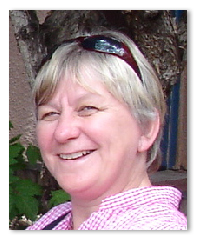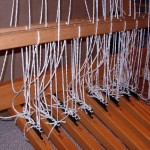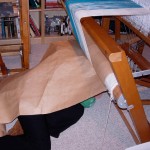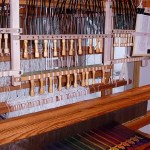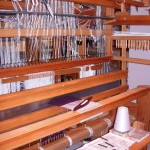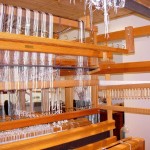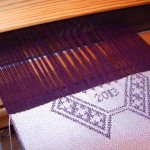Jette loves digging deeply into understanding weave structure. She teaches across the USA, Canada, and England, at colleges, OHS Master Weaver diploma courses, national and international conferences, including Convergence and Complex Weavers Seminars, guilds, and through her own studio. She writes The Loom Bench, a quarterly column for Fibre Focus explaining how weaves work. Jette volunteers at the Ontario Science Center, working on an 1865 Jacquard loom, is the former Chairman of Weaving Education for Ontario Handweavers and Spinners, former editor of Fibre Focus and has published many articles. Jette’s drawloom damask pieces have been shown in the US, Holland, Switzerland, and Canada.
www.huroniahandweavers.org/teanaustaye.html
WHITE NOISE
All Tied Up
418 Sunday PM
The tie-up quadrant of a draft is a powerful design tool. It is the most important part of the draft and yet is seldom considered as a design area. For straight threadings, it is usually based on a diagonal line. However, by dividing an 8 shaft tie-up into 4 quadrants, a huge number of combinations of weave structures become possible on the surface of the cloth. We can weave anything from twill to tricot, from waffle to summer and winter, M’s and O’s to double weaves, all on one warp with slight changes to the tie-up. Emphasis is placed on freeing your tie-up from its fetters and boundaries by understanding how the tie-up and its component sections work. And you only need to thread once!
white noise
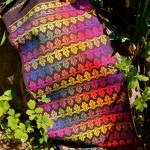 What Goes Up? What Comes Down? A short drawloom primer
What Goes Up? What Comes Down? A short drawloom primer
628 Monday PM
Drafting for a two-harness loom such as a drawloom is very different than drafting for a one-harness regular floor loom. This short introduction to designing for the drawloom covers how to use different weave structures such as double weave, lampas, Bronson lace and damask on the drawloom, how to determine the tie-up, how to figure out what the long-eyed heddles do to create the weave and how pattern blocks interact with the ground weave to form cloth.

